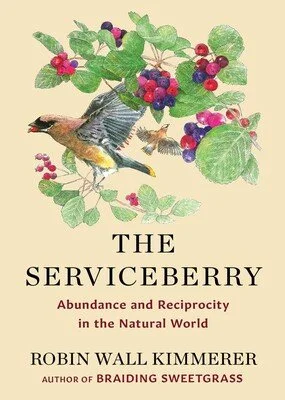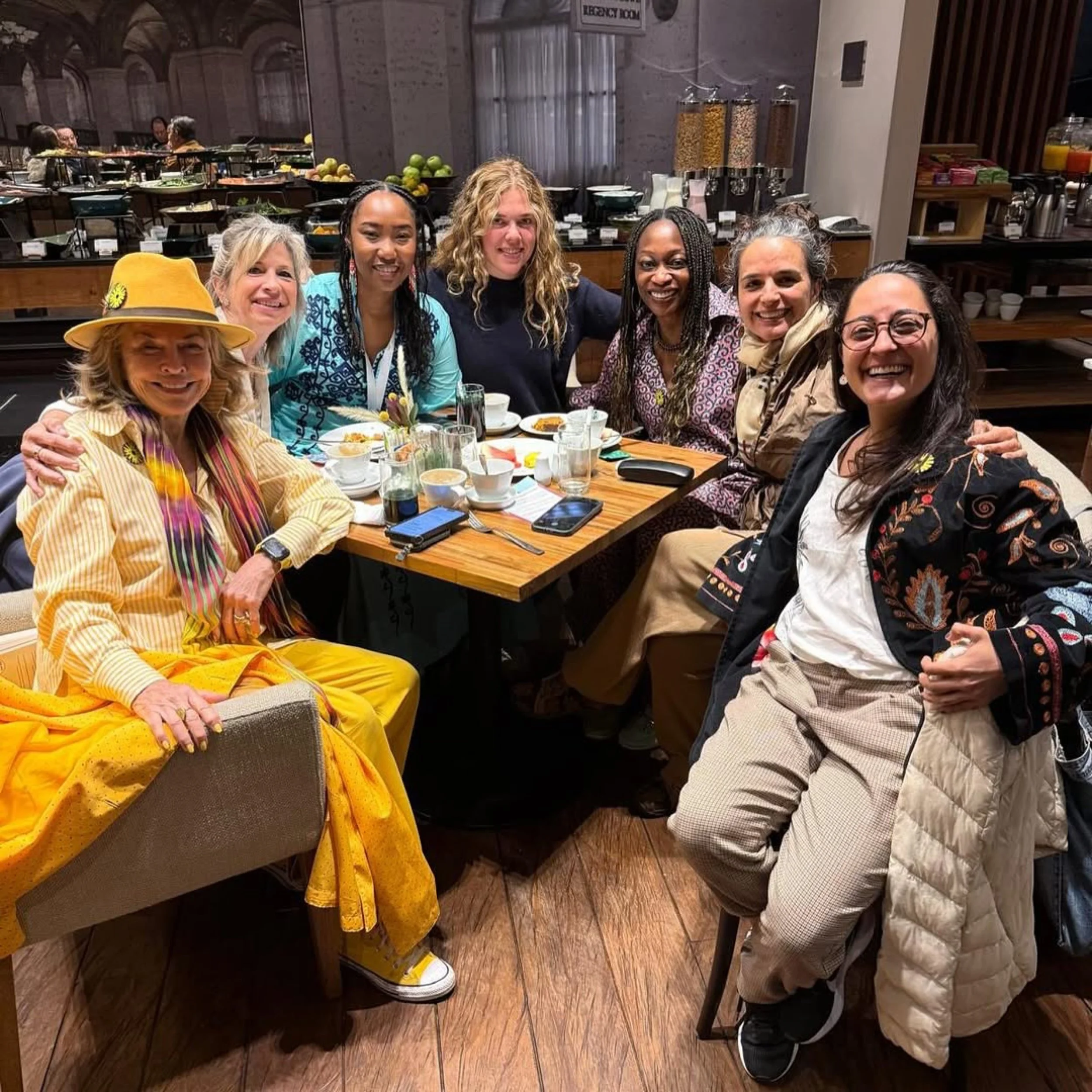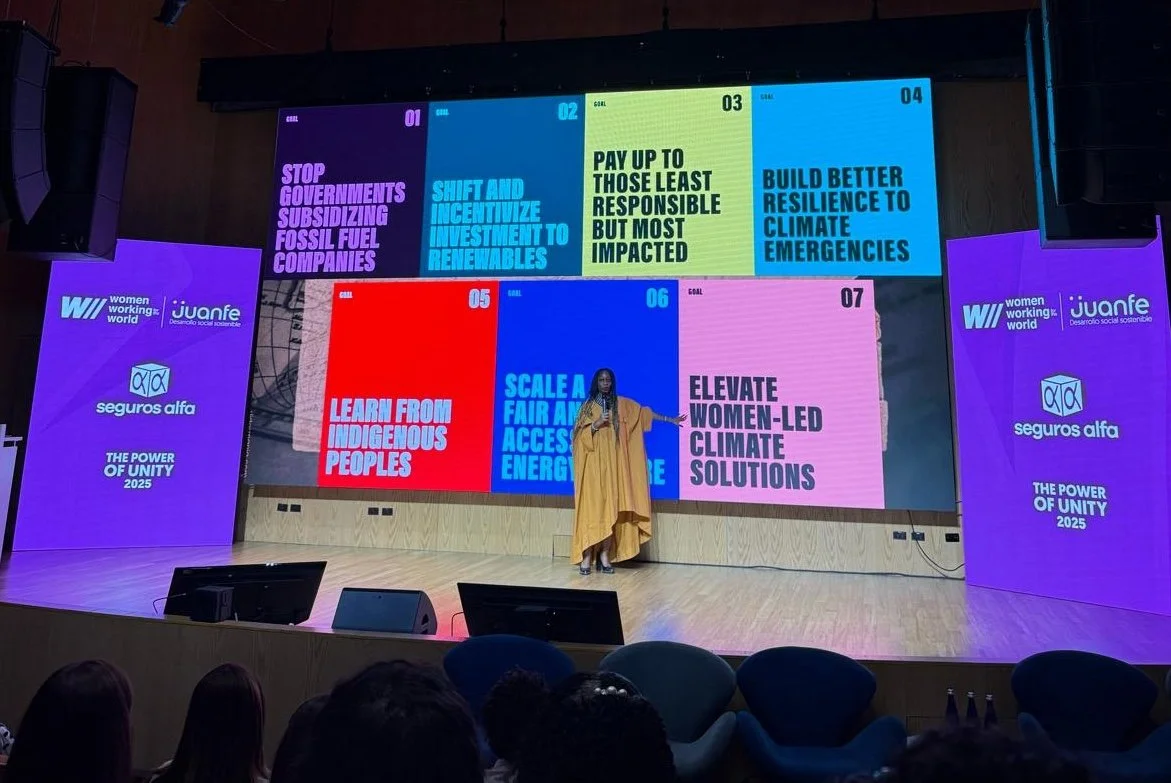Dear Readers,
I am currently reading (and loving) a book gifted to me by one of my co-founders of Project Dandelion, Ronda Carnegie. This slim book, The Serviceberry by Robin Wall Kimmerer, shares small stories, largely from the author's own experiences, framed by the book’s subtitle, powerful in its simplicity and meaning — “Abundance and Reciprocity in the Natural World.”
These simple yet profound stories frame a worldview that is distinctly different from the ones at the roots of so many of our global challenges — arising from the opposite of abundance and reciprocity. I urge you to gift this beautifully articulated thesis to yourself and consider gifting to others. It just might shift your thinking on service, on trust, on relationships, on the entire so-called market economy, and on the deep need for more personal connections, between us and the natural world, and among us, as we seek meaning and purpose.
I often find both meaning and renewed purpose when I’m in a convening of women and men who are committed to making a positive impact in their communities, companies, and governments. This is why I so often sign up to participate in such gatherings — and have, during my life’s journey, created and curated such convenings: TEDWomen, Connected Women Leaders Forums, women’s empowerment retreats (one of which I wrote about in last week’s newsletter), and the Women Working for the World forums, which I’m writing about this week.
I hope you can receive these sharings of experiences as ‘gifts’ — bits of insights or information gleaned from speakers and other participants, and most importantly, from my perspective, as further evidence of the importance of in-person connections, especially now when so many of our relationships are sustained through chats and digital messaging. I rely on that, too, and am grateful for the global community connected here, but for me, the gift of presence, of physical connection and collective experiences and participation, cannot be replicated or replaced.
So I traveled to Bogota, Colombia, last month — as I have done for many years — to participate in a convening called, appropriately, Women Working for the World (WW4W).
Introducing Catalina Escobar at this year's WW4W Forum. (Courtesy of WW4W)
This annual conference began as a way to raise awareness of the transformative work of the Colombia-based Juanfe Foundation and has evolved over the past decade into Latin America’s largest and most influential convening of women and men changemakers.
I met Catalina Escobar, the founder of WW4W and the founder and CEO of the Juanfe Foundation, through a US State Department and Vital Voices mentoring program that I wish still existed. Through this unique partnership initiative, I was asked to mentor Catalina, who was seeking to expand her work beyond Colombia.
From my first meeting with Catalina, I knew I would gain as much or more as her mentor as she would as my mentee! Her passion to serve Colombia’s most vulnerable communities was evident and already firmly rooted in purposeful programs which I visited often during my subsequent visits to the Juanfe Foundation.
What I witnessed was a unique model of service and care that addressed the challenges of unwanted pregnancies among the very young, usually as a result of family or community violence, the attendant health issues, plus the loss of educational opportunities and the inevitable lifelong economic struggles.
Catalina Escobar hugs one of the students in her teen mother education program; my visit to the daycare center for some time with the adorable babies last year.
Juanfe’s programs take a 360-degree approach to solving these multiple challenges by providing medical care during and after pregnancies, education, and skills training. The impact can be measured in the high percentage of healthy babies and well-prepared mothers with job opportunities, shifting their futures from one of economic uncertainty to economic independence — disrupting a cycle of violence and poverty that limits the potential of girls in so many communities.
Very soon after we began to work together, I shared Catalina’s passion to expand Juanfe’s programs to other communities and countries facing the same challenges. While I'd seen other programs addressing these challenges, Juanfe’s program and the long-term impact was different and documented. Thousands of girls transformed from victims to fully empowered, educated, and economically independent survivors and better prepared parents, often becoming leaders in their communities.
I committed to support Catalina’s mission to lift up the Juanfe model of care and to learn from others engaged in similar work. That was the purpose of creating an annual convening, a learning platform to share best practices across all the interconnected social justice challenges.
At the first WW4W and every year since, I have put together a delegation of US women and men to come with me to Cartagena, Medellin, and Bogota to attend WW4W, to visit Juanfe Foundation programs, and to participate in the forum.
This year’s 11th convening was the largest yet with more than 1,000 women and men over two days in Bogota, with a purposeful agenda focused on impact for transformational change. The program included courageous women and men sharing their survivor stories and leaders from Europe, India, Africa, the US, and several Latin American countries sharing their strategies.
(l-r) Pat Mitchell, Trish Malloch Brown, Yurshell Rodriguez Hooker, Vasser Seydel, Hafsat Abiola, Durga Julia Sánchez, and Marcela Fernandez. (Credit: Yurshell Rodriguez Hooker Instagram)
Catalina opened the meeting with a clear message: “We change the world one woman at a time.” That was the spirit that marked this year's gathering, where girls and women leaders and other experts raised their voices to call for structural and sustainable changes based on empathy, justice and co-responsibility, or as botanist Robin Kimmerer (in the book I referenced at the beginning) might describe it, to embrace abundance and reciprocity as the foundational principles for sustainable change for individuals, communities, and countries.
Catalina and Juanfe’s programs unlock potential for sustainable change by opening up opportunities for girls whose options are most often defined by scarcity and the violence and policies of extraction, rather than reciprocity.
The two days were a gift to all of us, too, who attended, and the reciprocal learnings will continue to resonate in the many communities and countries represented. A few highlights:
Voices that inspire action
Hafsat Abiola presenting at WW4W 2025.
The forum featured a keynote from Hafsat Abiola, co-founder and co-leader of Connected Women Leaders and Project Dandelion.
Hafsat shared the history of her family in Nigeria; a history that includes the loss of both her parents to the struggle to transition Nigeria from military rule to a democracy. Hafsat became a leader in the movement towards that democracy following her mother’s assassination and her father’s death in prison, and the learnings she shared were a powerful testimony to one of the themes of the gathering: “Movements create change!”
Hafsat and her personal story about sacrifice, commitment to a cause, and the power of collective action also led her to join me, Ronda Carnegie, and our inspiring leader/founder, Ireland’s first woman president and a global leader for climate justice, Mary Robinson, to create Project Dandelion as a movement of movements, to create the collective action necessary for sustainable change. There were many participants at WW4W already wearing the Dandelion pins and committed to doing their part to shape a more just and sustainable future.
Women leading on climate
On the panel I moderated: “Women, Climate and the Nature of Power” we learned more about how this future is already being shaped and in particular, the role of women’s leadership. I posed the question: What if the most powerful answer to the climate crisis lay not just in politics or technology, but in the untapped collective power of women?
The panel of experienced leaders had powerful answers to that question as they shared their work across many sectors: Adriana Soto, speaking from the governmental perspective of what she has been able to do with policy and new sustainability focused programs as Bogota’s Secretary of Environment. María López, a much respected Colombian leader and content creator, shared the stories of Indigenous communities leading solutions for water equity, food security, and gender equality — stories that are documented in The Art of Resilience short film series that you can view for free on WaterBear.com.
I was also very pleased to welcome Lyana Latorre, The Rockefeller Foundation’s VP in Colombia and Latin America, to this discussion as her presence and participation indicates a new priority at the Foundation to elevate and support Latin American environmental initiatives. Interestingly, The Rockefeller Foundation's commitment to supporting such good work is not new as it was a key funder of the International Center for Tropical Agriculture (Centro Internacional de Agricultura Tropical, or CIAT), founded six years ago and very active today, in Cali, Colombia.
Trish Malloch Brown, chair of the global philanthropic board of CIAT, captivated the audience with her presentation of the scope and depth of CIAT's research, which explores solutions from the soil to the sky — literally! — and also houses a global seed bank that is key to feeding the world. That work and the many other critical scientific projects being done at this institution and its partner organizations reminded us of how many solutions to the nature and climate crisis already exist and how close we are to a healthier, safer, cleaner environment. (Read more about this truly incredible seed bank.)
One more leader that I was especially proud to introduce on this panel is Vasser Seydel, executive director of The Oxygen Project, which optimizes the power of social media to inform and activate climate actions to protect our oceans and other necessary ecosystems that sustain life. Vasser and her team of young activists have created a successful collective action campaign to oppose deep seabed mining and are currently creating a campaign to lift up the voices of Indigenous elders whose wisdom has never been more needed.
It was a very special gift to be able to introduce Vasser, who is my granddaughter, as well as a highly effective next-generation leader working with passion and purpose to face the many challenges her generation has inherited. Her activism and leadership and the many other youth activists participating in WW4W give me the hope that fuels my activism!
I’ve written about this before, but I believe it so strongly, it bears repeating. Everytime I’m at a convening of active, engaged people, I am more and more convinced that activism is the antidote to aging and to despair. For me, so is the gift of convenings like WW4W.
There is an abundance of convenings (and though I admit to participating in more than most, having attended six conferences in the past three months!), I consider my invitations and my engagement a true gift. For me, being in communities like WW4W and others is an opportunity to practice reciprocity, through sharing stories, lessons, and collective, collaborative strategies for action.
You don’t have to travel to Colombia or Africa to experience the gift of community. We can create that experience with all the choices we make. Ultimately, as Kimmerer explains in her book, it's a way of living “based upon reciprocity, where wealth comes from the quality of your relationships, not from the illusion of self-sufficiency.”
None of us are truly self sufficient. We need the connections of communities built on reciprocity. To quote my inspiring botanist and author, Robin Wall Kimmerer, once more: “We need to replenish the possibility of mutual flourishing.”
On the Earth. With the Earth, and with each other.
Onward!
- Pat







